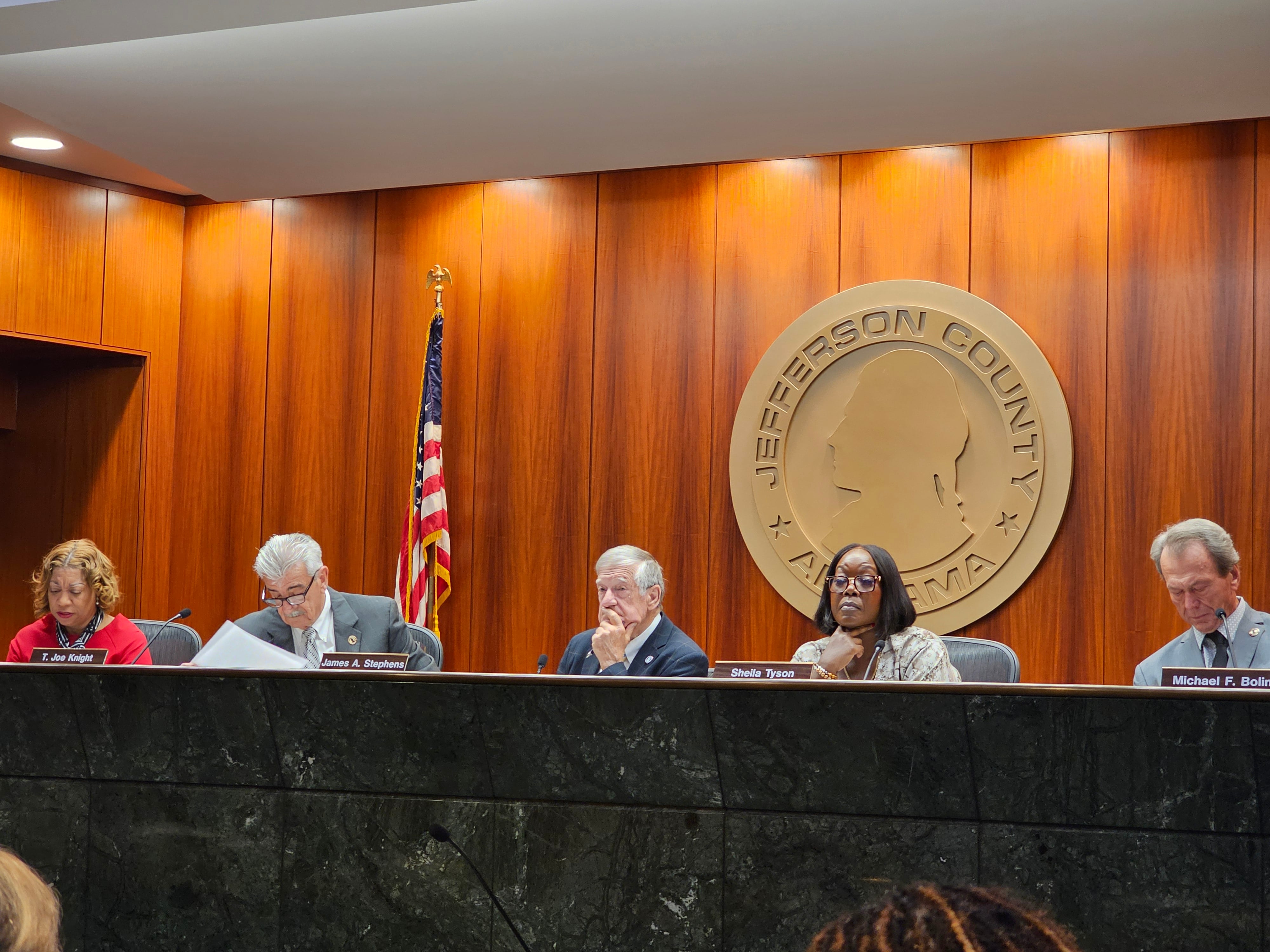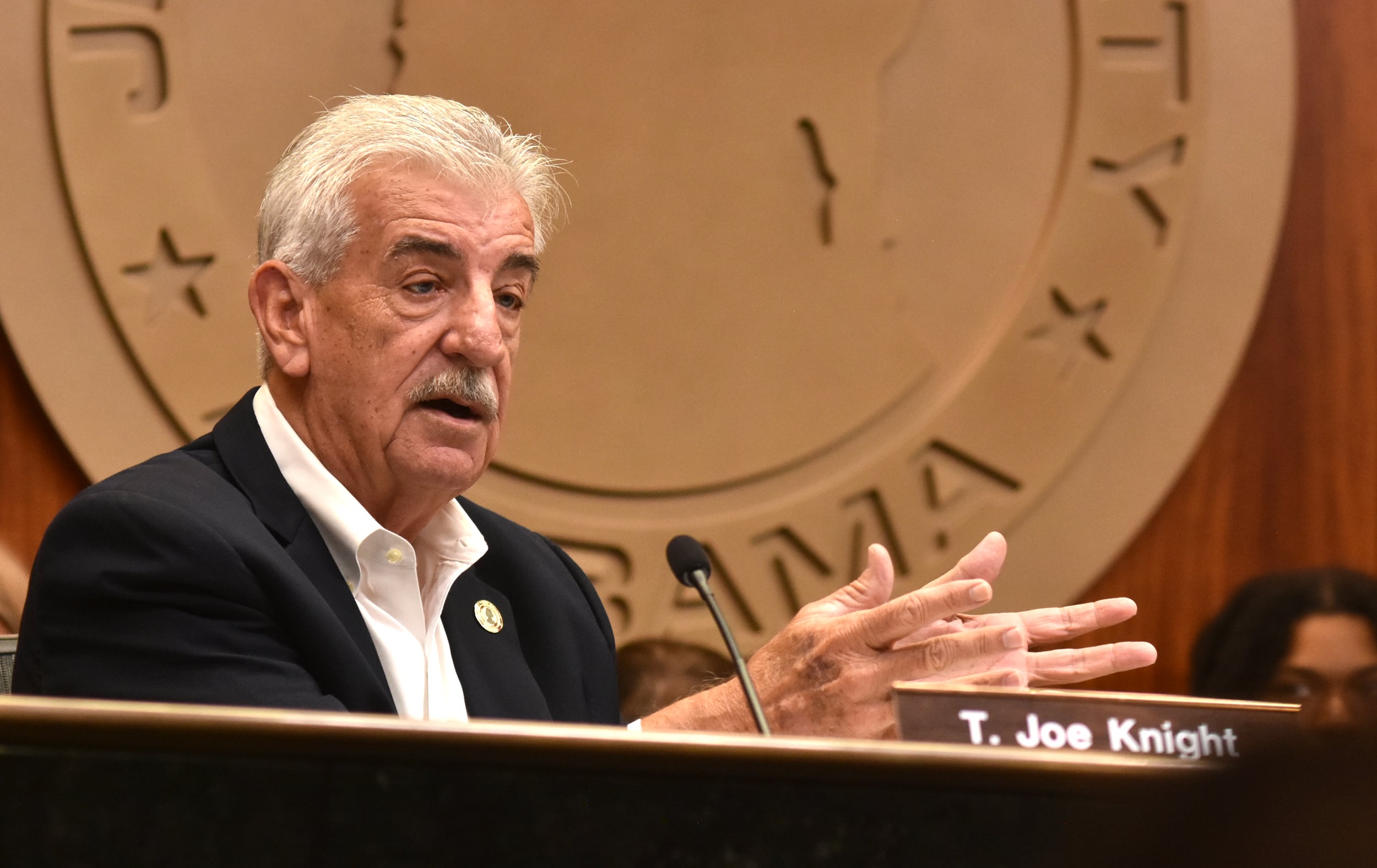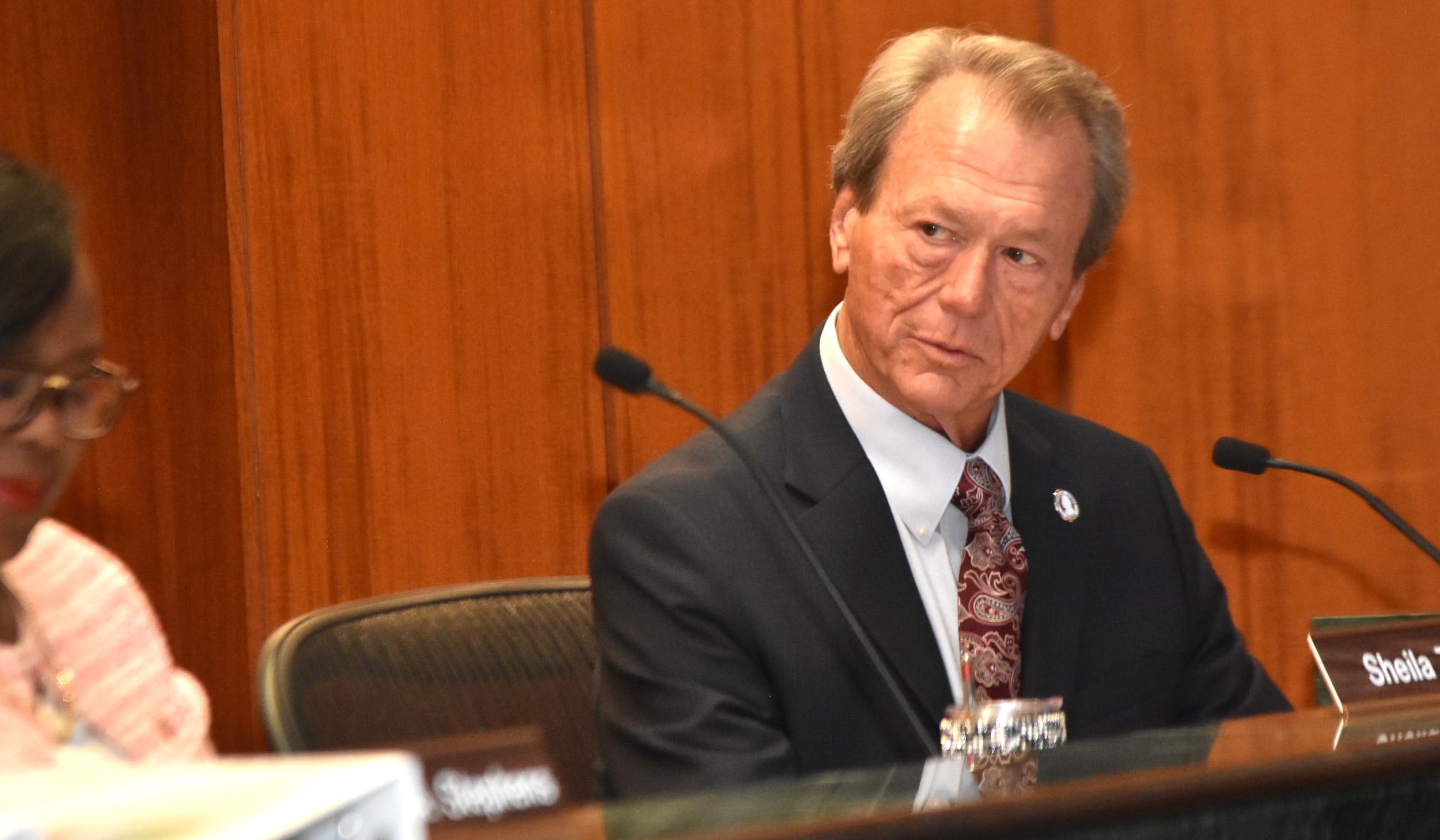$25 million in giveaways: Inside Jefferson County’s pork barrel bonanza
In the last several years, the people elected to run Alabama’s largest county have been doling out more and more pork, dipping into public dollars set aside for road paving and instead letting individual county commissioners pass out money to their favorite nonprofits and local projects.
In 2018, each of the five Jefferson County commissioners got $100,000 of public money to distribute to community organizations and infrastructure projects. Six years later, that figure had ballooned to $1.1 million each, according to the county commission. That allowed them to pass out bigger checks – and more of them for pet projects.
Some commissioners based in Birmingham wouldn’t answer calls to talk about how they chose to hand out millions. One past commissioner said he was concerned that the large amounts create a chance for “mischief.” One current commissioner defended the setup.
“We’ve gotten the county out of debt,” said Commission President Jimmie Stephens, who represents the western, rural side of the county. “We are now in a position to return money to the taxpayers for a good and sufficient public purpose. These people who did not have a ball field now have a place to have a ball field.”
In the past six years, the county commission has distributed more than $25 million through the Community Grant Program, AL.com and The Birmingham Times found in a review of county finance and budget records. Some of that spending has gone to government-related recipients, such as the Jefferson County Board of Education, libraries, and fire districts, while other grants have been distributed to nonprofits.
[Can’t see the chart? Click here.]
But most of the organizations aren’t providing reports of how they’re spending the public dollars, and the county commission isn’t asking for the receipts, two commissioners said in interviews. That’s despite the county’s rules requiring the nonprofits to report back about how the money was spent within 60 days of spending the money.
AL.com and The Birmingham Times identified a sample that included some of the top recipients over the past six years and requested that the county provide the spending reports and any other documents they had received from the recipients. While the county provided the applications for funding and other records the groups submitted in their requests, the county could only provide a report on how the money was spent for just one grant.
Empowerment Inc., which received a total of nearly $700,000 in grants between 2022 and 2024, provided a receipt to the county for $450,000 in 2023 for the Steel City Jazz Fest, the records show.
[Read more: Here are the top recipients of Jefferson County’s pork money]
Other organizations did not provide spending reports, according to the county officials.
In a response to a records request on Feb. 7, the county said it did not have spending reports for any of the other recipients.
“At this time Finance has shared all of the documents that it has received,” said Helen Hays, county spokeswoman, in an email. “We acknowledge it is not all of the required documents, but it is what has been provided to us.”
Hays referred questions about the lack of receipts to the organizations.
‘It creates mischief’
In one instance, Commissioner Lashunda Scales distributed a $100,000 grant, pulled directly from federal pandemic aid money, to the Penny Foundation in 2023 for the nonprofit’s Magic City Connections program, which founder and CEO Lyord Watson Jr. said included an economic empowerment conference and a “stop the violence” rally.
Scales, whose district includes north Birmingham, declined to answer questions for this story.
Commissioner Lashunda Scales, whose district includes north Birmingham. The Birmingham Times
Commissioner Joe Knight, whose district includes the northeast part of the county, said in an interview that the county’s rules for the grants require recipients to keep their receipts for three years in the case of an audit.
“Yes, there should be receipts. It’s important for proof of purpose,” Knight said. “You got this money, how did you spend it? And it’s up to each individual commission office to understand that and to be able to provide that.”
David Carrington served on the commission from 2010 to 2018. He said he was “concerned” about the apparent lack of oversight of how the community grants would be used and voted against discretionary spending when the resolution first came before the commission in his second term.
“It creates mischief,” he said. “It concerns me materially. It’s the public’s money.”
Carrington added that he believes that a lack of spending reports constitutes “a failure” on the part of the commissioner distributing the money, as well as the recipient, the finance department, and the county manager.
“In times past we knew there was mischief,” he said. “The contract is clear that there is supposed to be a report of how the money is used.”
Commissioner Sheila Tyson, whose district includes central Birmingham and parts of Bessemer, did not respond to multiple requests for comment for this story.
Here’s how the grants work: Organizations submit requests for the money each year, typically including their plans for spending the money, along with a budget and tax records. In some instances, the county’s finance and legal departments have rejected the requests during the vetting process. But once the applications go to the county commission for a vote, the commissioners almost always approve them.
“In times past we knew there was mischief. The contract is clear that there is supposed to be a report of how the money is used.”
Former Jefferson County Commissioner David Carrington
The grant recipient has a year to spend the money. The recipients are supposed to provide detailed reports to the county finance department, the granting commission’s office, and the county manager’s office, per the county’s community grant program.
In addition to not obtaining receipts in some instances, commissioners distributed public money — including some originally intended for infrastructure projects — to the same nonprofits over and over again, a review of county records by AL.com and The Birmingham Times found. For example, one nonprofit, Exposure Community Development Corporation, which provides music education, got 11 grants in five years.
“We should not be doing discretionary grants in order to perpetuate an organization, in other words each year we’re funding a certain entity,” Knight said. “It should be a one-time thing. I can’t support your project each and every year.”
Where does the money come from?
The commission votes on the budget for these grants each year, said Theo Lawson, county attorney.

In 2018, each of the five Jefferson County commissioners got $100,000 of public money to distribute to community organizations and infrastructure projects. Six years later, that pork money had ballooned to $1.1 million each. The Birmingham Times
When the federal government sent emergency pandemic funding to state and local governments through the Coronavirus Aid, Relief, and Economic Act (CARES) in fiscal year 2022, commissioners in Jefferson County voted to redistribute millions of dollars to bolster their pork fund. They put an additional $2 million each into the grant fund in fiscal year 2022 and another $1.63 million each in fiscal year 2023 from the American Rescue Plan Act (ARPA), county records show.
But even after most of the pandemic-era funding ran out before 2024, commissioners still gave themselves more than $3.5 million total in county funds to spend during the 2024 fiscal year, which ended September 30, 2024.
According to county records, in September 2021, the commission approved $10 million to be equally distributed among each district at $2 million each for that year “to advance the improvement of Jefferson County infrastructure.”
But, a year later, the commission passed a resolution to expand the use of that money to include community grants.
“We’ve gotten the county out of debt. We are now in a position to return money to the taxpayers for a good and sufficient public purpose.”
Commission President Jimmie Stephens
Lawson said in an email that the legal and finance departments vet applications for funding based on how the money will be used.
“We ensure that the purpose meets all legal requirements prior to presentation to the Commission for consideration,” he said. “Even if a spend report is not received, the County has a built-in fail-safe mechanism by requiring that recipients retain spending records and make them available to the County for inspection upon request.”
Lawson declined to comment on why the county commission was not following its own policy to request the spending reports. But if a commissioner had a reason to believe that grant funds weren’t spent based on the contract, the county’s legal office would “take any appropriate legal action to recover the funds,” Lawson said.
Commissioner Stephens said the county’s spending has increased because there’s more money to spend now.

In the past six years, the Jefferson County Commission has distributed more than $25 million through the Community Grant Program, AL.com and The Birmingham Times found in a review of county finance and budget records. Grant money helped pay for a new ball field in McCalla. Lavon Beard | For The Birmingham Times
“I can look and make sure taxpayer dollars are spent like they are supposed to be spent,” Stephens said. “If you look at the majority of our [spending], they are mainly tangible items, things that you can see have been done.”
Stephens added that he can see the commission “being more vigilant” about requesting spending reports from the grant recipients in the future.
What will change moving forward?
Last fall, Knight, who is the commission’s finance chair, prepared a memo about his ideas for changes to the way the money is handed out.
He wrote in the draft memo that commissioners would no longer be able to access a contingency fund intended for emergencies, and that $400,000 for government entities only per commissioner would be strictly set aside for road paving and other infrastructure. And a separate fund of $1.5 million, pulled from interest earned on the federal pandemic money, would be used for nonprofits.

Commissioner Joe Knight represents northeast Jefferson County. He said groups should not be getting pork money multiple times. “It should be a one-time thing. I can’t support your project each and every year.” The Birmingham Times
Knight also wanted to propose a new rule.
“I would recommend that no one entity be allocated more than $200,000,” Knight wrote in an internal memo that he sent to commissioners while they were working on the budget.
Danielle Cater serves as the chief of staff for Commissioner Mike Bolin, whose district includes over-the-mountain communities like Mountain Brook and Homewood. She also held that title for former commissioner Steve Ammons, who stepped down in May 2023. Cater said the office “rarely” has received detailed reports and as a result has taken steps to ensure that grant recipients follow up.
“All of our new contracts have an extra page in them, … a ‘reporting’ page after they spend the money,” Cater said. “We added that page starting in October, and checked with legal to make sure, because follow-ups have been rare … The thought going forward is, ‘If you don’t turn in the Use of Funds report for your money in 2025, we’re not giving you future grant money in 2026.”

Mike Bolin represents over-the-mountain communities like Mountain Brook and Homewood on the Jefferson County Commission. His office is now requiring grant recipients to fill out spending reports or they won’t get money in 2026. The Birmingham Times
